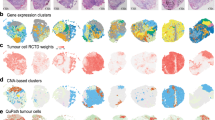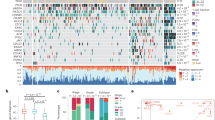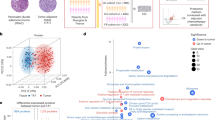Abstract
Prostate cancer and breast cancer are the most common malignancies in the western world. Androgen receptor (AR) and PTEN both have been well documented to have important roles in prostate carcinogenesis. In contrast, AR and PTEN in breast carcinogenesis have not been well studied. Furthermore, the crosstalk and connection between those two pathways remain unclear. Increased AR expression in prostate cancers, combined with decreased PTEN expression, portends a poor clinical outcome. Paradoxically, both high AR and high PTEN levels, detected by immunohistochemistry, in primary breast carcinomas have been associated with better disease-free survival. Here, we performed in silico analysis of publicly available microarray data sets from prostate or breast carcinomas. We found an inverse correlation between AR and PTEN transcript expression in prostate cancer tissues in contrast to the positive correlation in breast cancer. These data led us to hypothesize that AR may directly affect PTEN transcriptional regulation in prostate and breast cancer cells. Here, we show for the first time that AR inhibits PTEN transcription in prostate cancer cells, whereas AR upregulates PTEN transcription in breast cancer cells, which mechanistically explains both the immunohistochemical PTEN–AR expressional data noted in clinical trials and in our in silico analysis of the transcriptomes of breast and prostate cancers. In addition, we have fine-mapped the AR-binding motif within the PTEN promoter. Here we show that, in patients with Cowden syndrome, an inherited cancer syndrome caused by germline mutations scattered throughout PTEN, point variants affecting the 3′ end of the AR-binding motif result in abrogation of androgen-mediated transcriptional regulation of PTEN expression. We may speculate that the differential AR effect on PTEN may begin to explain organ-specific and perhaps sex-specific neoplasia predisposition in Cowden syndrome, as well as why only a fraction of women with germline PTEN mutations develop breast cancer, depending on the androgen steroid milieu and levels.
This is a preview of subscription content, access via your institution
Access options
Subscribe to this journal
Receive 50 print issues and online access
$259.00 per year
only $5.18 per issue
Buy this article
- Purchase on Springer Link
- Instant access to full article PDF
Prices may be subject to local taxes which are calculated during checkout






Similar content being viewed by others
References
Agoff SN, Swanson PE, Linden H, Hawes SE, Lawton TJ . (2003). Androgen receptor expression in estrogen receptor-negative breast cancer. Immunohistochemical, clinical, and prognostic associations. Am J Clin Pathol 120: 725–731.
Agrawal S, Pilarski R, Eng C . (2005). Different splicing defects lead to differential effects downstream of the lipid and protein phosphatase activities of PTEN. Hum Mol Genet 14: 2459–2468.
Anzick SL, Kononen J, Walker RL, Azorsa DO, Tanner MM, Guan XY et al. (1997). AIB1, a steroid receptor coactivator amplified in breast and ovarian cancer. Science 277: 965–968.
Bedolla R, Prihoda TJ, Kreisberg JI, Malik SN, Krishnegowda NK, Troyer DA et al. (2007). Determining risk of biochemical recurrence in prostate cancer by immunohistochemical detection of PTEN expression and Akt activation. Clin Cancer Res 13: 3860–3867.
Birrell SN, Bentel JM, Hickey TE, Ricciardelli C, Weger MA, Horsfall DJ et al. (1995). Androgens induce divergent proliferative responses in human breast cancer cell lines. J Steroid Biochem Mol Biol 52: 459–467.
Chen H, Lin RJ, Schiltz RL, Chakravarti D, Nash A, Nagy L et al. (1997). Nuclear receptor coactivator ACTR is a novel histone acetyltransferase and forms a multimeric activation complex with P/CAF and CBP/p300. Cell 90: 569–580.
Dotzlaw H, Moehren U, Mink S, Cato AC, Iniguez Lluhi JA, Baniahmad A . (2002). The amino terminus of the human AR is target for corepressor action and antihormone agonism. Mol Endocrinol 16: 661–673.
Eng C . (2003). PTEN: one gene, many syndromes. Hum Mutat 22: 183–198.
Ghosh PM, Malik SN, Bedolla RG, Wang Y, Mikhailova M, Prihoda TJ et al. (2005). Signal transduction pathways in androgen-dependent and -independent prostate cancer cell proliferation. Endocr Relat Cancer 12: 119–134.
Hodgson MC, Astapova I, Cheng S, Lee LJ, Verhoeven MC, Choi E et al. (2005). The androgen receptor recruits nuclear receptor CoRepressor (N-CoR) in the presence of mifepristone via its N and C termini revealing a novel molecular mechanism for androgen receptor antagonists. J Biol Chem 280: 6511–6519.
Ihaka S, Gentleman R . (1996). R: a language for data analysis and graphics. J Comput Graph Stat 5: 299–314.
Li H, Gomes PJ, Chen JD . (1997). RAC3, a steroid/nuclear receptor-associated coactivator that is related to SRC-1 and TIF2. Proc Natl Acad Sci USA 94: 8479–8484.
Liaw D, Marsh DJ, Li J, Dahia PL, Wang SI, Zheng Z et al. (1997). Germline mutations of the PTEN gene in Cowden disease, an inherited breast and thyroid cancer syndrome. Nat Genet 16: 64–67.
Lin HK, Hu YC, Lee DK, Chang C . (2004). Regulation of androgen receptor signaling by PTEN (phosphatase and tensin homolog deleted on chromosome 10) tumor suppressor through distinct mechanisms in prostate cancer cells. Mol Endocrinol 18: 2409–2423.
Manin M, Baron S, Goossens K, Beaudoin C, Jean C, Veyssiere G et al. (2002). Androgen receptor expression is regulated by the phosphoinositide 3-kinase/Akt pathway in normal and tumoral epithelial cells. Biochem J 366: 729–736.
Marsh DJ, Coulon V, Lunetta KL, Rocca-Serra P, Dahia PL, Zheng Z et al. (1998). Mutation spectrum and genotype-phenotype analyses in Cowden disease and Bannayan-Zonana syndrome, two hamartoma syndromes with germline PTEN mutation. Hum Mol Genet 7: 507–515.
Mikhailova M, Wang Y, Bedolla R, Lu XH, Kreisberg JI, Ghosh PM . (2008). AKT regulates androgen receptor-dependent growth and PSA expression in prostate cancer. Adv Exp Med Biol 617: 397–405.
Mutter GL, Lin MC, Fitzgerald JT, Kum JB, Baak JP, Lees JA et al. (2000). Altered PTEN expression as a diagnostic marker for the earliest endometrial precancers. J Natl Cancer Inst 92: 924–930.
Nan B, Snabboon T, Unni E, Yuan XJ, Whang YE, Marcelli M . (2003). The PTEN tumor suppressor is a negative modulator of androgen receptor transcriptional activity. J Mol Endocrinol 31: 169–183.
Ogawa Y, Hai E, Matsumoto K, Ikeda K, Tokunaga S, Nagahara H et al. (2008). Androgen receptor expression in breast cancer: relationship with clinicopathological factors and biomarkers. Int J Clin Oncol 13: 431–435.
Perren A, Weng LP, Boag AH, Ziebold U, Thakore K, Dahia PL et al. (1999). Immunohistochemical evidence of loss of PTEN expression in primary ductal adenocarcinomas of the breast. Am J Pathol 155: 1253–1260.
Sircar K, Yoshimoto M, Monzon FA, Koumakpayi IH, Katz RL, Khanna A et al. (2009). PTEN genomic deletion is associated with p-Akt and AR signalling in poorer outcome, hormone refractory prostate cancer. J Pathol 218: 505–513.
Stambolic V, MacPherson D, Sas D, Lin Y, Snow B, Jang Y et al. (2001). Regulation of PTEN transcription by p53. Mol Cell 8: 317–325.
Stambolic V, Suzuki A, de la Pompa JL, Brothers GM, Mirtsos C, Sasaki T et al. (1998). Negative regulation of PKB/Akt-dependent cell survival by the tumor suppressor PTEN. Cell 95: 29–39.
Tang Y, Eng C . (2006). PTEN autoregulates its expression by stabilization of p53 in a phosphatase-independent manner. Cancer Res 66: 736–742.
Teresi RE, Planchon SM, Waite KA, Eng C . (2008). Regulation of the PTEN promoter by statins and SREBP. Hum Mol Genet 17: 919–928.
Teresi RE, Zbuk KM, Pezzolesi MG, Waite KA, Eng C . (2007). Cowden syndrome-affected patients with PTEN promoter mutations demonstrate abnormal protein translation. Am J Hum Genet 81: 756–767.
Visakorpi T, Hyytinen E, Koivisto P, Tanner M, Keinanen R, Palmberg C et al. (1995). in vivo amplification of the androgen receptor gene and progression of human prostate cancer. Nat Genet 9: 401–406.
Wang SI, Parsons R, Ittmann M . (1998). Homozygous deletion of the PTEN tumor suppressor gene in a subset of prostate adenocarcinomas. Clin Cancer Res 4: 811–815.
Wang Y, Kreisberg JI, Ghosh PM . (2007). Cross-talk between the androgen receptor and the phosphatidylinositol 3-kinase/Akt pathway in prostate cancer. Curr Cancer Drug Targets 7: 591–604.
Wang Y, Mikhailova M, Bose S, Pan CX, deVere White RW, Ghosh PM . (2008). Regulation of androgen receptor transcriptional activity by rapamycin in prostate cancer cell proliferation and survival. Oncogene 27: 7106–7117.
Wen Y, Hu MC, Makino K, Spohn B, Bartholomeusz G, Yan DH et al. (2000). HER-2/neu promotes androgen-independent survival and growth of prostate cancer cells through the Akt pathway. Cancer Res 60: 6841–6845.
Whang YE, Wu X, Suzuki H, Reiter RE, Tran C, Vessella RL et al. (1998). Inactivation of the tumor suppressor PTEN/MMAC1 in advanced human prostate cancer through loss of expression. Proc Natl Acad Sci USA 95: 5246–5250.
Zbuk KM, Eng C . (2007). Cancer phenomics: RET and PTEN as illustrative models. Nat Rev Cancer 7: 35–45.
Zhou XP, Marsh DJ, Morrison CD, Chaudhury AR, Maxwell M, Reifenberger G et al. (2003a). Germline inactivation of PTEN and dysregulation of the phosphoinositol-3-kinase/Akt pathway cause human Lhermitte-Duclos disease in adults. Am J Hum Genet 73: 1191–1198.
Zhou XP, Waite KA, Pilarski R, Hampel H, Fernandez MJ, Bos C et al. (2003b). Germline PTEN promoter mutations and deletions in Cowden/Bannayan-Riley-Ruvalcaba syndrome result in aberrant PTEN protein and dysregulation of the phosphoinositol-3-kinase/Akt pathway. Am J Hum Genet 73: 404–411.
Acknowledgements
We are grateful to Dr George Stark for critical review of manuscript drafts and for helpful discussions. This work was supported, in part, by the William Randolph Hearst Foundations and Susan G Komen for the Cure Breast Cancer Research Foundation. CE is the Sondra J and Stephen R Hardis Chair of Cancer Genomic Medicine at the Cleveland Clinic, was a Doris Duke Distinguished Clinical Scientist and is an American Cancer Society Clinical Research Professor, generously funded, in part, by the FM Kirby Foundation.
Author information
Authors and Affiliations
Corresponding author
Ethics declarations
Competing interests
The authors declare no conflict of interest.
Additional information
Supplementary Information accompanies the paper on the Oncogene website
Supplementary information
Rights and permissions
About this article
Cite this article
Wang, Y., Romigh, T., He, X. et al. Differential regulation of PTEN expression by androgen receptor in prostate and breast cancers. Oncogene 30, 4327–4338 (2011). https://doi.org/10.1038/onc.2011.144
Received:
Revised:
Accepted:
Published:
Issue Date:
DOI: https://doi.org/10.1038/onc.2011.144
Keywords
This article is cited by
-
Role of the pioneer transcription factor GATA2 in health and disease
Journal of Molecular Medicine (2023)
-
Distinct metabolic profiles associated with autism spectrum disorder versus cancer in individuals with germline PTEN mutations
npj Genomic Medicine (2022)
-
ARe we there yet? Understanding androgen receptor signaling in breast cancer
npj Breast Cancer (2020)
-
Identification of key pathways and genes in PTEN mutation prostate cancer by bioinformatics analysis
BMC Medical Genetics (2019)
-
Androgen and AR contribute to breast cancer development and metastasis: an insight of mechanisms
Oncogene (2017)



